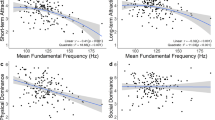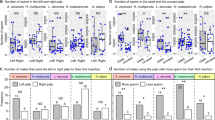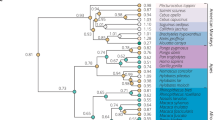Abstract
FLUCTUATING asymmetry (FA) refers to the random, stress-induced deviations from perfect symmetry that develop during the growth of bilaterally symmetrical traits1,2. Individual differences in the level of FA may influence mate choice3: in a number of species, females prefer to mate with males that have more symmetrical sexual ornaments4–7. As the degree of FA has been shown to reflect the ability of individuals to cope with a wide variety of environ-mental stresses2,8,9, it has been suggested that mating preferences for symmetry evolve for adaptive reasons, because the degree of FA provides honest information about male quality10,11. Here I use simple, artificial neural networks to show that such preferences are likely to arise in the absence of any link between symmetry and quality, as a by-product of selection for mate recognition.
This is a preview of subscription content, access via your institution
Access options
Subscribe to this journal
Receive 51 print issues and online access
$199.00 per year
only $3.90 per issue
Buy this article
- Purchase on Springer Link
- Instant access to full article PDF
Prices may be subject to local taxes which are calculated during checkout
Similar content being viewed by others
References
Van Valen, L. Evolution 16, 125–142 (1962).
Palmer, A. R. & Strobeck, C. A. Rev. Ecol. Syst. 17, 391–421 (1986).
Watson, P. J. & Thornhill, R. Trends Ecol. Evol. 9, 21–25 (1994).
Møller, A. P. Nature 357, 238–240 (1992).
Møller, A. P. Behavl Ecol. Sociobiol. 32, 371–376 (1993).
Swaddle, J. P. & Cuthill, I. C. Nature 367, 165–166 (1994).
Radesäter, T. & Halldórsdóttir, H. Anim. Behav. 45, 626–628 (1993).
Leary, R. & Allendorf, F. W. Trends Ecol. Evol. 4, 214–217 (1989).
Parsons, P. A. Biol. Rev. 65, 131–145 (1990).
Møller, A. P. Anim. Behav. 40, 1185–1187 (1990).
Møller, A. P. & Pomiankowski, A. Behavl Ecol. Sociobiol. 32, 167–176 (1993).
Zahavi, A. J. theor. Biol. 53, 205–214 (1975).
Packer, C. & Pusey, A. E. Nature 362, 595 (1993).
Harvey, I. F. & Walsh, K. J. Ecol. Entomol. 18, 198–202 (1993).
Enquist, M. & Arak, A. Nature 361, 446–448 (1993).
Arak, A. & Enquist, M. Phil. Trans. R. Soc. Lond. B340, 207–213 (1993).
Staddon, J. E. R. Am. Nat. 109, 541–545 (1975).
Leimar, O., Enquist, M. & Sillen-Tullberg, B. Am. Nat. 128, 469–490 (1986).
Ryan, M. J. Oxf. Surv. Evol. Biol. 7, 157–195 (1990).
Ryan, M. J. & Keddy-Hector, A. Am. Nat. 139, S4–S35 (1992).
Ryan, M. J. & Rand, A. S. Phil. Trans. R. Soc. Lond. B340, 187–195 (1993).
Author information
Authors and Affiliations
Rights and permissions
About this article
Cite this article
Johnstone, R. Female preference for symmetrical males as a by-product of selection for mate recognition. Nature 372, 172–175 (1994). https://doi.org/10.1038/372172a0
Received:
Accepted:
Issue Date:
DOI: https://doi.org/10.1038/372172a0
This article is cited by
-
Source dipole analysis reveals a new brain response to visual symmetry
Scientific Reports (2021)
-
The aesthetic preference for symmetry dissociates from early-emerging attention to symmetry
Scientific Reports (2018)
-
Beauty alone is insufficient: female mate choice in the barn swallow
Ecological Research (2018)
-
Asymmetry of eye color in the common cuckoo
Scientific Reports (2017)
-
Nasolabial symmetry and esthetics in cleft lip and palate: analysis of 3D facial images
Clinical Oral Investigations (2015)
Comments
By submitting a comment you agree to abide by our Terms and Community Guidelines. If you find something abusive or that does not comply with our terms or guidelines please flag it as inappropriate.



